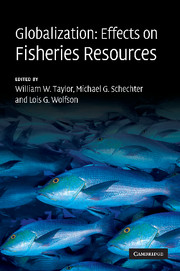Book contents
- Frontmatter
- Contents
- List of contributors
- About the editors
- Foreword
- Preface
- Acknowledgments
- Introduction: Globalization and fisheries: a necessarily interdisciplinary inquiry
- Part I Impacts of globalization on fisheries and aquatic habitats
- Part II Case studies of globalization and fisheries resources
- Part III Governance and multilevel management systems
- 13 Great Lakes fisheries as a bellwether of global governance
- 14 Ecosystem-based insights on northwest Atlantic fisheries in an age of globalization
- 15 “Fishy” food laws
- Part IV Ethical, economic, and policy implications
- Part V Conclusions and recommendations
- Index
- Plate section
- References
14 - Ecosystem-based insights on northwest Atlantic fisheries in an age of globalization
Published online by Cambridge University Press: 10 August 2009
- Frontmatter
- Contents
- List of contributors
- About the editors
- Foreword
- Preface
- Acknowledgments
- Introduction: Globalization and fisheries: a necessarily interdisciplinary inquiry
- Part I Impacts of globalization on fisheries and aquatic habitats
- Part II Case studies of globalization and fisheries resources
- Part III Governance and multilevel management systems
- 13 Great Lakes fisheries as a bellwether of global governance
- 14 Ecosystem-based insights on northwest Atlantic fisheries in an age of globalization
- 15 “Fishy” food laws
- Part IV Ethical, economic, and policy implications
- Part V Conclusions and recommendations
- Index
- Plate section
- References
Summary
FISHERIES SYSTEMS IN AN AGE OF GLOBALIZATION: THE NEED FOR NEW HEURISTICS TO COPE WITH COMPLEXITY
In an age of consolidated vertically integrated seafood corporations, industrial capture and culture fisheries, declining wild fish populations, shifting government policies, and unpredictable biophysical changes operating on scales ranging from local to planetary, the complexity and uncertainty of fisheries systems have never been greater. In the face of global stock collapses, budgetary restraints, and extreme overfishing of species thought to be managed effectively, national fisheries managers are increasingly left to cope with and adapt to failures rather than taking a confident proactive stance toward fisheries under their managerial control (Ludwig et al. 1993; Thompson and Trisoglio 1997; Finlayson and McCay 1998; Ludwig 2001; Bavington 2002; McCay 2002). Human expropriation of up to 35 percent of marine primary productivity is overwhelmingly driven by the capitalist mode of production with its focus on capital accumulation and profitability through the generation of exchange value. Economic growth continues to be achieved in marine fisheries by adopting advanced industrial technologies in harvesting, maintaining government subsidies, and expanding demand for marine biomass in global markets. The aim is fulfilling the desires of wealthy consumers for wild, cultured, and terrestrial animal products (Pauly and Christensen 1995; Naylor et al. 2000; Pauly et al. 2001). The global fisheries situation at local, regional, national, and transnational scales raises troubling ecological and equity issues central to sustainability, and involves interconnected biophysical, social, and political complexity (Caddy and Regier 2002; Barange 2003; Bavington et al. 2004).
- Type
- Chapter
- Information
- Globalization: Effects on Fisheries Resources , pp. 331 - 363Publisher: Cambridge University PressPrint publication year: 2007



